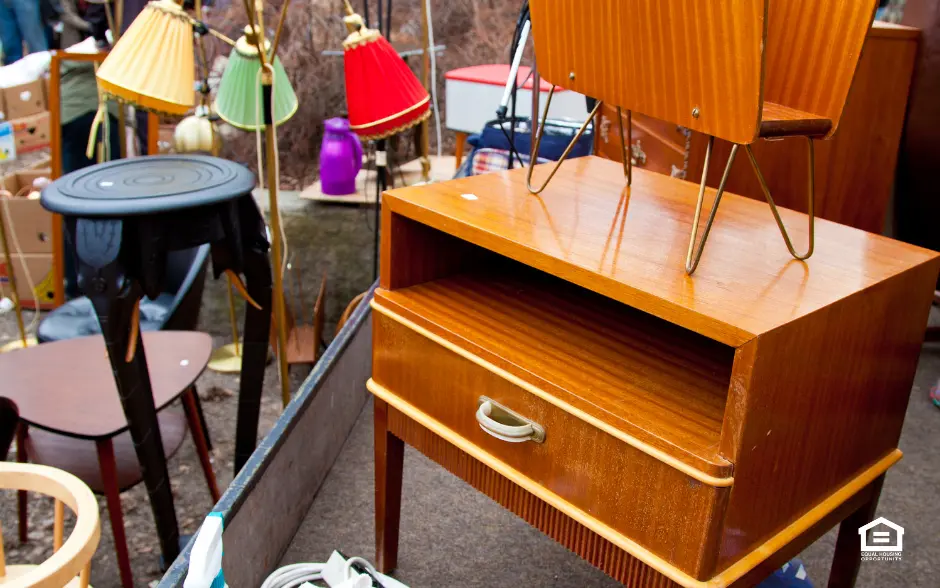What to Do with Abandoned Tenant Property?
The best way to handle abandoned property left by a tenant and avoid legal problems is with a little common sense and following your state laws. While these laws differ from state to state, usually a property owner cannot simply take or keep personal property left behind by a former tenant, nor can they throw it away. Instead, a rental property owner must follow a series of important steps to document and control access to the items. When done according to local law, rental property owners can safely and confidently dispose of a former tenant’s abandoned property.

When a tenant moves out, they sometimes leave things behind. There are many stories about tenants who leave a rental home in poor condition, leaving trash and personal items for the property owner to clean up. But some tenants will also leave items such as furniture, unforwarded mail, personal items, and clothing.
Abandoned property can be a problem for property owners for several reasons. Beyond needing to clear out the rental home for the next tenant, abandoned property can lead to serious legal trouble if not handled properly. What often complicates the disposal of abandoned personal property is that the laws governing personal property left in rental homes not only differ from state to state, but also sometimes even from county to county. For property owners, it is critical to know the law that governs each of your rental properties and follow them to the best of your ability.
For most places, the proper handling of abandoned property begins with several common sense tasks. For example, a property owner should ensure that they have control over access to the former tenant’s personal property by recovering all keys and garage door openers, or by changing the rental home’s locks. Some states may allow personal property to be secured in a storage unit or require the items be left on the premises, each location will have different provisions. One of the worst things a property owner can do is allow a former tenant’s personal property to be stolen after the tenant has moved out. Civil and criminal charges may result, creating many unwanted legal problems.
Once secure, another important task is to document the abandoned property. This can be done in several ways, such as by making a detailed video recording of the items, taking photographs, or by making a detailed list. Taking photos and video accompanied by a detailed written list of items is the best way to document the property’s condition, in case questions about property damage arise later on.

Once you determine that you are legally able to move the abandoned items, it is a good idea to invite a neutral person to act as a witness as you do so. This will prevent any questions about theft or illegal handling of the tenant’s property, and provide confirmation that the property is being handled safely and appropriately. In most cases, holding property until terms of the lease are met will not be lawful, make sure you fully understand the tenant rights to reclaim their property in your area.
Another common sense step to take when dealing with abandoned property is to notify the former tenant in writing that property was left behind and what you have done with it to date. If the law allows, you could also include a statement informing the tenant that they have until a certain date to claim their items, and what you plan to do with their things after that date. Again, laws vary, but many places allow property owners to keep, sell, or otherwise dispose of abandoned property once all of the proper steps have been taken.
Even if things go smoothly, dealing with a former tenant’s abandoned personal property will take up valuable time and cost you money. The potential legal problems are real and can make the process complex. Instead of trying to navigate these murky circumstances yourself, consider how much better it would be to let Real Property Management do it for you. Our property management professionals have in-depth knowledge of local laws and can ensure that abandoned property is handled accordingly. We believe that the best defense against potential legal problems is communication and maintaining good tenant relations. With our help, you can avoid unpleasant tenant interactions and time-consuming hassles, leaving you free to allocate your time in more profitable ways. Please contact your nearest Real Property Management office for more information.
We are pledged to the letter and spirit of U.S. policy for the achievement of equal housing opportunity throughout the Nation. See Equal Housing Opportunity Statement for more information.
Get the Neighborly App
In addition to Real Property Management's expert skills in managing your rental property, you can utilize Neighborly's other brands to maintain and enhance your home. Use the Neighborly App to get connected to local home service professionals. Download and receive offers only available on the App.
Depending on current health and safety regulations in your area, some of the services mentioned in this post may not be available. Neighborly service providers will follow the latest health and safety guidelines provided by the local and state governments. Please check with your local Neighborly service provider for details at the time you need service(s).






